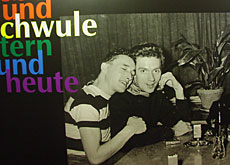
A long fight for rights

Switzerland was among the first European countries to lift laws prohibiting homosexual sex among adults. Until 1942, it was a punishable crime.
According to gay historian Ernst Ostertag, the primary motivation for doing so was to remove the issue from political debate.
“Parliament and the government… said, when we do this, we will never have to talk about this ‘dirty’ item homosexuality again,” said Ostertag.
Nevertheless the gay scene was flourishing, albeit in secret. An organisation for homosexual men – the first of its kind – had been founded in Zurich in 1932. Under the leadership of the German actor, Karl Meier, who made his home in the city, it became known as Der Kreis (the Circle).
From 1943 it was publishing a groundbreaking magazine of the same name in German and French. An English edition was started in 1952.
In its heyday in the 1950s, Der Kreis had 2,000 members and had built up an international network in Europe and the United States.
Ostertag says that because of the conservative climate, it wasn’t recognised as a magazine or group – it was officially a gathering of readers with subscribers.
Repression
The period of calm was shattered in 1957, following the murder of two middle-class homosexuals by rent boys. A public outcry ensued, with the media and police increasingly associating homosexuality with crime.
This meant that gays were regularly subjected to raids at their meeting places and homes, and were put on an official list of “registered homosexuals”.
Der Kreis suffered a drop in subscribers and produced its last edition in 1967. Meier never got over the shock and died after a period of ill health in 1974.
However, a new group was founded a year later and started to push for equal rights, taking advantage of the worldwide social revolution which started in 1968.
But then came the arrival of Aids in 1980s. From 1985 gay groups began working with the health authorities to fight the spread of HIV and to inform the population.
Ostertag says the issue really hit home after a well-known television presenter at the time, André Ratti, launched the new anti-Aids campaign with the sentence “My name is André Ratti, I am gay and have Aids.”
Aids now had a human face in Switzerland. Ratti died a year later.
“Because sexual practice was discussed openly, homosexuality also became part of the discussion and part of public interest, and that helped to changed minds,” added Ostertag.
Rainbow culture
The 1990s ushered in “the rainbow culture” – a period of campaigns, activities and marches by Swiss gay groups calling for more rights. The year 1992 marked the final lifting of restrictions on homosexuals, such as in the armed forces.
A boost came in 2001, when the canton of Geneva approved Switzerland’s first legal gay partnerships. The first couple was registered on May 8 of that year. Canton Zurich followed suit in 2003 and Neuchâtel in 2004.
The government first turned its attention to the question of registered partnerships for homosexuals in 2000, when it gave its backing to the drawing up of a draft law on the matter. The legislation gained the approval of both houses in June 2004.
However, opponents of the proposed law have forced a vote on the issue, which is due to take place on June 5, 2005.
swissinfo, Isobel Leybold-Johnson
1942 Homosexuality decriminalised in Switzerland.
1943 Der Kreis magazine founded.
1957 Two murders in gay scene; repression follows.
1967 Der Kreis closes.
1960s-1970s Rights activists step up activities.
1980s Aids appears; gay groups start working with the authorities.
2001 Geneva allows registered partnerships; Zurich and Neuchâtel follow.
2004 Parliament approves national law on registered partnerships.
2005 Nationwide vote on registered partnerships.

In compliance with the JTI standards
More: SWI swissinfo.ch certified by the Journalism Trust Initiative




























You can find an overview of ongoing debates with our journalists here . Please join us!
If you want to start a conversation about a topic raised in this article or want to report factual errors, email us at english@swissinfo.ch.